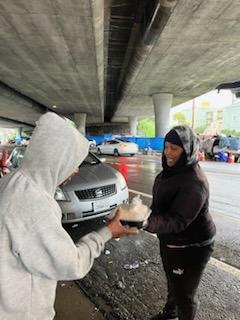In a society where homelessness affects a diverse range of individuals, it is essential to delve into the unique, demanding situations confronted with the aid of people with disabilities. The intersection of homelessness and incapacity unveils a complex internet of things that contributes to the vulnerability of this population. Understanding those intricacies is paramount in developing sustainable answers that address the foundation reasons for homelessness among people with disabilities.
The blog will discover the particular situations that make human beings with disabilities more vulnerable to homelessness, dropping light on the systemic boundaries, societal attitudes, and financial disparities that perpetuate this trouble. By analyzing these key factors, we can pave the way for effective interventions prioritizing inclusivity, accessibility, and empowerment for individuals going through homelessness and incapacity.
Join us in this journey as we find the important elements influencing homelessness amongst humans with disabilities and discover evidence-based answers that keep the promise of creating lasting alternatives to their lives.
Understanding the Factors Contributing to Homelessness
A. Economic Factors
Income inequality is a vast driving force of homelessness, as disparities in profit distribution bring about economic instability for many individuals and families. Those on the lower cease of the income spectrum regularly conflict to come up with the money for primary necessities, inclusive of housing, leading to housing lack of confidence and potential homelessness. Additionally, unemployment costs and task instability can further exacerbate economic challenges, in particular in the course of instances of monetary downturn or recession. Poverty, both chronic and situational, performs a crucial position in homelessness, as individuals living under the poverty line may additionally lack the financial resources to stable stable housing arrangements.
B. Lack of Affordable Housing
The loss of affordable housing is a critical aspect contributing to homelessness in lots of communities. Across the United States, there may be a growing housing affordability disaster, with housing expenses outpacing profits growth. This imbalance within the housing market makes it increasingly more challenging for low-earning individuals and families to discover less expensive housing options. More housing stock, especially in city regions with high demand, further exacerbates the problem, main to lengthy waitlists for low-cost housing appliances. Gentrification and urban redevelopment tasks also can displace low-income citizens, forcing them out of their homes and into homelessness.
C. Mental Health Issues
Mental fitness problems are frequent among homeless populations and might significantly impact a person’s capacity to hold stable housing. Untreated or inadequately managed intellectual illnesses, consisting of schizophrenia, bipolar ailment, and severe melancholy, can impair decision-making, social functioning, and general well-being. Stigma and discrimination surrounding intellectual contamination, in addition, compound the challenges confronted by homeless people, making it hard for them to get entry to housing, employment, and assistance offerings. Limited get entry to mental fitness care and treatment exacerbates intellectual fitness issues amongst homeless populations, perpetuating a cycle of homelessness and untreated mental infection.
D. Substance Abuse
Substance abuse is intently linked to homelessness, with many people experiencing homelessness struggling with addiction and substance use disorders. Substance abuse troubles, which include alcoholism, drug addiction, and opioid dependency, can contribute to housing instability and homelessness with the aid of impairing judgment, growing economic strain, and straining private relationships. A co-occurring disorder, in which substance abuse coexists with intellectual fitness situations, further complicates the photograph, making it hard for people to access appropriate remedies and assistance services. Barriers to substance abuse treatment, consisting of restricted availability of treatment applications and stigma surrounding addiction, avert efforts to deal with substance abuse amongst homeless populations.
E. Systemic Issues and Discrimination
Systemic troubles, which include racial disparities and discrimination, play a full-size position in homelessness, mainly among marginalized groups. People of color, consisting of Black and Indigenous individuals, are disproportionately stricken by homelessness due to systemic racism and structural barriers to housing, employment, and social offerings. LGBTQ individuals additionally face heightened risks of homelessness due to discrimination based on sexual orientation and gender identification, which can cause family rejection, housing discrimination, and restrained access to help networks. Involvement inside the crook justice system similarly exacerbates the threat of homelessness, as individuals with criminal facts regularly face obstacles to housing and employment upon reentry into society. Addressing these systemic issues and dismantling discriminatory practices is crucial for addressing homelessness and ensuring equitable get entry to to housing and support services for all people.
Impact of Homelessness on Individuals with Disabilities
Individuals with disabilities dealing with homelessness enjoy more than a few challenges that exacerbate their vulnerability and restrict their admission to crucial resources and guide structures. The intersection of homelessness and disability creates a complex web of issues that substantially impact the well-being of this populace.
A. Increased Vulnerability
Homelessness amplifies the vulnerability of people with disabilities, exposing them to heightened risks and hardships. The lack of stable housing exacerbates current health situations and can lead to the onset of recent ones, in addition to compromising their universal well-being.
The data reveal a statement wherein disabled people constitute a disproportionately excessive percentage of the homeless populace, underscoring the urgent need to cope with the precise vulnerabilities they face.
B. Limited Access to Resources and Support
Accessing important assets and assistance services turns into a vast assignment for homeless people with disabilities. The lack of expertise among nearby councils and homelessness guide charities frequently hinders their potential to go out of homelessness successfully.
Barriers, along with issues securing blessings, long-term employment troubles, and insufficient supportive housing options, compound the challenges faced by this populace.
C. Challenges in Accessing Healthcare
Homeless people with disabilities stumble upon good-sized boundaries in getting access to healthcare offerings because the absence of an everlasting deal can hinder their potential to get hold of essential scientific interest.
Factors related to homelessness, along with mental health troubles, can complicate diagnoses and affect the management of health conditions, highlighting the vital need for stepped-forward healthcare to get entry to and guidance for this vulnerable organization.
The impact of homelessness on people with disabilities is profound, underscoring the pressing want for comprehensive solutions that address the precise, demanding situations faced by this populace. By spotting and addressing those problems, we can work towards creating an extra inclusive and supportive environment for individuals at the intersection of homelessness and incapacity.
Identifying Key Solutions
A. Housing-first Approach
The housing-first technique prioritizes supplying solid and everlasting housing as the first step in addressing homelessness. Rather than requiring individuals to meet certain criteria, which includes sobriety or participation in treatment programs, earlier than accessing housing, this approach gives instant entry to safe and low-priced housing options. By securing strong housing first, people experiencing homelessness can more efficaciously cope with underlying troubles, inclusive of mental health challenges and substance abuse, with the stableness and help of a permanent home. Housing-first packages have proven successful in decreasing homelessness and improving health outcomes for individuals, highlighting the effectiveness of this approach in addressing the complex wishes of homeless populations.
B. Accessible and Supportive Services
Accessible and supportive services are essential components of efforts to deal with homelessness and assist people in preserving stable housing. These offerings might also encompass intellectual health treatment, substance abuse counseling, case management, and get entry to to healthcare. Providing wraparound services that cope with the numerous desires of homeless individuals, such as childcare, transportation assistance, and employment assist, can assist individuals triumph over barriers to housing balance and self-sufficiency. Supportive housing fashions, which integrate low-cost housing with on-website online aid services, provide a holistic technique to addressing the complex desires of homeless people and selling lengthy-term housing balance.
C. Community Collaborations and Partnerships
Collaborations and partnerships among government agencies, nonprofit corporations, healthcare carriers, and community stakeholders are critical for efficiently addressing homelessness and maximizing sources. By leveraging the understanding and assets of multiple stakeholders, groups can develop complete techniques and packages to prevent and stop homelessness. Coordination between housing companies, social service agencies, and healthcare companies can facilitate seamless access to housing and supportive offerings for homeless individuals. Community-based initiatives, including homeless outreach groups and coordinated entry structures, streamline access to assets and ensure that individuals acquire the assistance assistance they need to get out of homelessness.
D. Employment and Income Support
Employment and income assistance packages play a crucial function in supporting individuals experiencing homelessness to reap monetary stability and independence. Access to task education, training, and employment possibilities can empower people to steady, strong, and sustainable employment, growing their ability to come up with the money for housing and meet their fundamental desires. Income aid applications, such as condo assistance, Supplemental Security Income (SSI), and Temporary Assistance for Needy Families (TANF), provide monetary assistance to individuals and households experiencing homelessness, supporting them to cover housing fees and different prices. Addressing obstacles to employment and offering financial help, these packages contribute to housing balance and economic self-sufficiency for homeless individuals.
Implementing Sustainable Solutions
A. Policy Reforms and Advocacy Efforts
Policy reforms and advocacy efforts play a vital position in addressing homelessness among people with disabilities. Federal rules regulating wages, supplemental protection earnings (SSI), and entry to offerings appreciably affect the homelessness fees amongst this population. Advocacy for policy changes that promote less costly housing, increase earnings assistance, and get the right access to healthcare and social services are vital to save you and alleviate homelessness among individuals with disabilities.
B. Investing in Supportive Housing Programs
Investing in supportive housing programs, including the Housing First version, is a crucial method in addressing homelessness among individuals with disabilities. The Housing First approach emphasizes supplying permanent supportive housing to people experiencing persistent homelessness, addressing their on-the-spot housing wishes, and imparting vital help offerings. Scaling up proof-based packages like Housing First can substantially reduce homelessness and enhance consequences for individuals with disabilities.
C. Strengthening Mental Health and Substance Abuse Treatment
Strengthening mental fitness and substance abuse treatment offerings is essential in addressing the complicated desires of people with disabilities experiencing homelessness. Co-occurring scientific situations like HIV/AIDS, hepatitis, and intellectual health issues are greater general amongst homeless people, underscoring the importance of incorporated healthcare offerings.
Access to first-class mental health and substance abuse remedies is critical in assisting people in their journey closer to stability and restoration.
D. Promoting Inclusive and Accessible Communities
Promoting inclusive and handy groups is essential in creating environments that aid individuals with disabilities experiencing homelessness. Many shelters are inaccessible to people with disabilities, highlighting the need for network-stage tasks to enhance accessibility and accommodation for this populace.
Creating inclusive groups that provide ok assist, resources, and opportunities for people with disabilities is essential in preventing homelessness and fostering long-term balance.
By specializing in policy reforms, making an investment in supportive housing programs, strengthening healthcare services, and promoting inclusive communities, sustainable solutions may be carried out to address homelessness among individuals with disabilities efficiently. These complete tactics purpose to create lasting change and enhance the well-being of this susceptible populace.
Recap
In conclusion, addressing homelessness amongst people with disabilities calls for a multifaceted approach that addresses the complicated elements contributing to homelessness and emphasizes the importance of sustainable answers. Economic demanding situations, loss of less costly housing, intellectual fitness problems, substance abuse, and systemic discrimination are a few of the critical factors that contribute to homelessness and have to be addressed comprehensively. By expertise in these elements and enforcing proof-based techniques, groups can successfully assist homeless individuals and work closer to ending homelessness.





